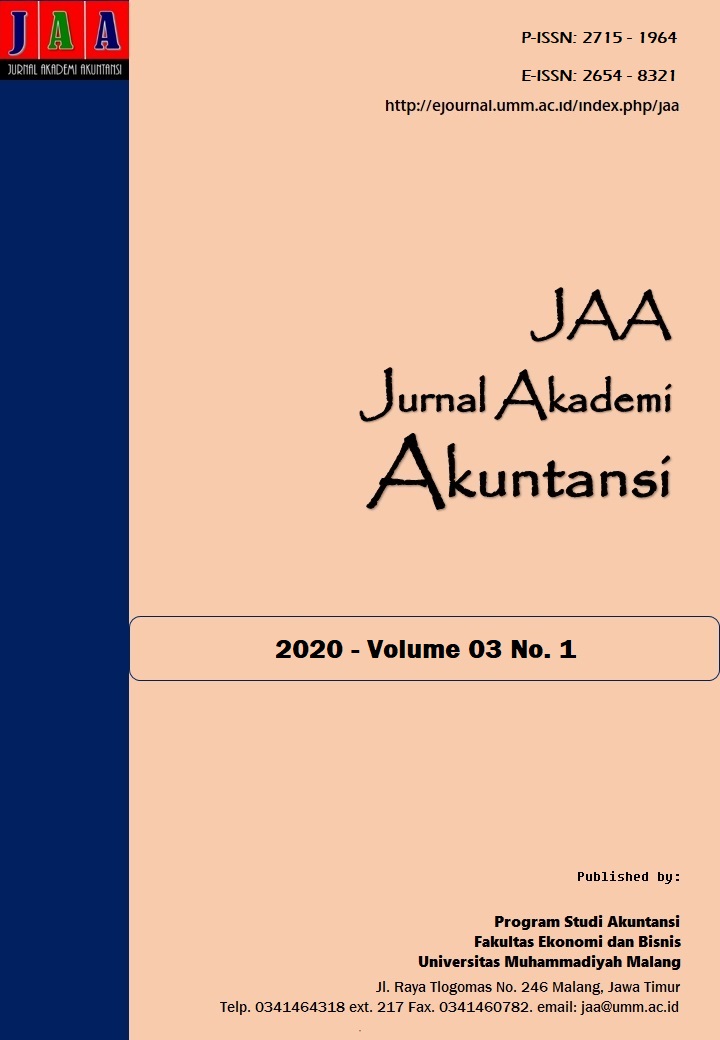PRAKTIK EARNING MANAGEMENT DAN PENGARUHNYA TERHADAP KOMPENSASI BONUS
DOI:
https://doi.org/10.22219/jaa.v3i1.11915Keywords:
Bonus, Compensation, Earnings managementAbstract
The purpose of this study is to identify earning management practices and analyze the effect of earnings management on bonus compensation. The object of research uses the Business Entity and Sharia Business Unit. The selected sample is 34 companies. Variables used are earnings management and bonus compensation. Data is collected through documentation in the form of financial statements of Business Entities and Sharia Business Units in 2017 and 2018. This study uses a hypothesis test. The test method used is panel data test using EViews 10 software. The results showed that the practice of earning management in Sharia Business Entities and Business Units is mostly done by income maximalization or increasing profit (50%) and income minimizasion or decreasing profit (50%), and there is a significant influence between earning management practices and bonus compensation.
Downloads
References
Aprina, D.N. dan Khairunnisa. 2015. “Pengaruh ukuran perusahaan, profitabilitas, dan kompensasi bonus terhadap manajemen laba”. e-Proceeding of Management : Vol.2, No.3 Desember 2015 Page 3251.
Badruzaman, N. (2010). Earning management.
Baltagi, B. (2008). Econometric analysis of panel data. John Wiley & Sons.
Belkaoui, A. R. (2008). Teori Akuntansi jilid 1, Edisi Kelima.
Elfira, A. (2014). Pengaruh Kompensasi Bonus Dan Leverage Terhadap Manajemen Laba (Studi Empiris Pada Perusahaan Manufaktur yang Terdaftar di Bursa Efek Indonesia Tahun 2009-2012). Jurnal Akuntansi, 2(2).
Guidry, F., Leone, A. J., & Rock, S. (1999). Earnings-based bonus plans and earnings management by business-unit managers. Journal of accounting and economics, 26(1-3), 113-142.
Gurajati, D. (2006). Dasar-dasar Ekonometrika Ed ke-3. Erlangga. Jakarta.
Jensen, M. (1976). C. dan William, H. Meckling,”. Theory of the Firm: Managerial Behavior, Agency Cost and Ownership.
Kuncoro, M. (2003). Metode riset untuk bisnis dan ekonomi. Jakarta: Erlangga, 52.
Pujiningsih, A. I. (2011). Pengaruh Struktur Kepemilikan. Ukuran Perusahaan, Praktik Corporate Governence dan Kompensasi Bonus Terhadap Manajemen Laba.
Retnadi, D. (2008). Kredit Usaha Rakyat (KUR), Harapan dan Tantangan. Economic Review, 212.
Richardson, V. J. (1998). Information Asymmetry and Earnings Management: Some Evidence. http. ssrn. com.
Schipper, K. (1989). Earnings management. Accounting Horizons, 3(4), 91.
Scott, W. R. (2012). Financial Accounting Theory 6th edition’. NY: Pearson Prentice Hall.
Setiawati, L., & Na'im, A. (2000). Manajemen laba. Journal of Indonesian Economy and Business, 15(4), 424-441.
Shen, C. H., & Chih, H. L. (2005). Investor protection, prospect theory, and earnings management: An international comparison of the banking industry. Journal of Banking & Finance, 29(10), 2675-2697.
Subramanyam, K. R., & Wild, J. J. (2010). Analisis laporan keuangan. Jakarta: Salemba Empat.
Downloads
Published
Issue
Section
License
Copyright (c) 2020 siti zubaidah

This work is licensed under a Creative Commons Attribution-NonCommercial-ShareAlike 4.0 International License.
Jurnal Akademi Akuntansi is licensed under a Creative Commons Attribution-NonCommercial-ShareAlike 4.0 International License.
Authors who publish with this journal agree to the following terms:
- Authors retain copyright and grant the journal right of first publication with the work simultaneously licensed under a Creative Commons Attribution-NonCommercial-ShareAlike 4.0 International License that allows others to share the work with an acknowledgment of the work's authorship and initial publication in this journal.
- Authors are able to enter into separate, additional contractual arrangements for the non-exclusive distribution of the journal's published version of the work (e.g., post it to an institutional repository or publish it in a book), with an acknowledgment of its initial publication in this journal.
- Authors are permitted and encouraged to post their work online (e.g., in institutional repositories or on their website) prior to and during the submission process, as it can lead to productive exchanges, as well as earlier and greater citation of published work (See The Effect of Open Access).
Jurnal Akademi Akuntansi dilisensikan di bawah lisensi Creative Commons Attribution-NonCommercial-ShareAlike 4.0 International.
Penulis yang menerbitkan artikel di jurnal ini menyetujui ketentuan berikut:
- Penulis mempertahankan hak cipta dan memberikan hak jurnal atas publikasi pertama dengan karya yang secara serentak dilisensikan di bawah Lisensi Pengaitan Creative Commons yang memungkinkan orang lain untuk berbagi karya dengan pengakuan atas karya penulis dan publikasi awal dalam jurnal ini.
- Penulis dapat masuk ke dalam pengaturan kontrak tambahan yang terpisah untuk distribusi non-eksklusif versi karya jurnal yang diterbitkan (misalnya, mempostingnya ke repositori institusional atau mempublikasikannya dalam sebuah buku), dengan pengakuan publikasi awalnya di jurnal ini.
- Penulis diizinkan dan didorong untuk memposting pekerjaan mereka secara online (misalnya, di repositori institusional atau di situs web mereka) sebelum dan selama proses pengajuan, karena dapat mengarah pada pertukaran produktif, serta kutipan pekerjaan sebelumnya dan yang lebih besar (Lihat Pengaruh Akses Terbuka).
























